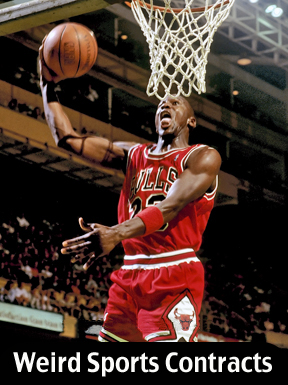Sometimes creative accounting pays off. Here are a few examples of
weird sports contracts throughout history.
Heir Jordan
 Unlike their counterparts in the big leagues, the average first-year minor league baseball players is paid about $1,100 a month. But not Michael Jordan. After retiring from a spectacular basketball career in 1993 to give pro baseball a try, Jordan signed with the farm system of the Chicago White Sox. At the time, the White Sox organization was owned by Jerry Reinsdorf, who also owned Jordan’s old basketball team, the Chicago Bulls. Sensing that Jordan might come back to the NBA some day if baseball didn’t work out (it didn’t), Reinsdorf paid Jordan $4 million in 1994 and 1995 to play minor league baseball, the same he would’ve been paid had he stayed in the NBA.
Unlike their counterparts in the big leagues, the average first-year minor league baseball players is paid about $1,100 a month. But not Michael Jordan. After retiring from a spectacular basketball career in 1993 to give pro baseball a try, Jordan signed with the farm system of the Chicago White Sox. At the time, the White Sox organization was owned by Jerry Reinsdorf, who also owned Jordan’s old basketball team, the Chicago Bulls. Sensing that Jordan might come back to the NBA some day if baseball didn’t work out (it didn’t), Reinsdorf paid Jordan $4 million in 1994 and 1995 to play minor league baseball, the same he would’ve been paid had he stayed in the NBA.
Good Things Come to Those Who Wait
In the 1980s and early 1990s, Bobby Bonilla was a six-time all-star, hitting more than 200 home runs for several teams. By 1999, he was 36 years and old and his career was winding down, but the New York Mets still signed him to a multi-year contract. His play, however, was mediocre—appearing in only 60 games, he had 12 hits and a .160 batting average while also frequently getting into arguments with manager Bobby Valentine. At the end of the 1999 season, the Mets released Bonilla, which meant buying out the $5.9 million he had left on his contract. But rather than have that sum on a tight payroll, they offered Bonilla a deal, which he accepted: Defer payment of the $5.9 million until 2011, at which point he’d receive the first payment of $1.19 million a year, for 25 years. By 2035, Bonilla will have earned $29.75 million, far more than the $5.9 million he was due.
The 65-Year-Old Quarterback
Before Steve Young played quarterback for the San Francisco 49ers, won a Super Bowl, and was elected to the Pro Football Hall of Fame, he played for the Los Angeles Express of the USFL, a pro football league that briefly rivaled the NFL in the 1980s, before it went bankrupt in 1986. So how did an upstart league convince a top prospect to join it instead of the well-established NFL? Express owner J. William Oldenburg offered Young $36 million…paid out over 43 years. And it doesn’t matter that the USFL went bankrupt—Young had the contract insured, so he’s still getting paid. What’s more is that the contract’s annual payment increases over time. Young will earn $1 million in 2014, and by the time the contract is fulfilled in 2027, the then-65-year-old former quarterback will get $3 million a year.







